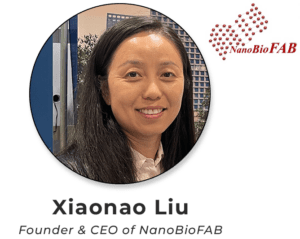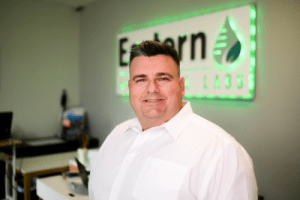
In Conversation with Helen Sabzevari, President & CEO of Precigen
A desire to end disease has taken her from a childhood in Iran to the Scripps Institute, to the NIH and the CEO of a cell and gene therapy company. Sabzevari is focused on developing a new treatment for a rare respiratory papilloma and mentoring the next generation of oncologists and immunologists.
By Alex Keown | May 23, 2024
| BioBuzz has been connecting the life science workforce since 2009. We’ve built an expansive community in the Mid-Atlantic with a national readership that spans from Massachusettes to Florida, and New York to California. For our next chapter, we’re building a proprietary talent logistics model to help employers source and hire life science talent. Learn more. |
Helen Sabzevari found her North Star early in life and has never wavered from that path. Since she was a middle school student in Iran, Sabzevari has wanted to eradicate disease. She dedicated her life and career in pursuit of that goal, helping to bring forth multiple therapeutics for various forms of cancer, autoimmune disorders and infectious diseases.
At Germantown-based Precigen, Sabzevari is looking at bringing forth an approved therapeutic, an AdenoVerse immunotherapy (PRGN-2012) aimed at recurrent respiratory papillomatosis (RRP). The company anticipates submitting a Biologics License Application for PRGN-2012 later this year. PRGN-2012, which earned Breakthrough Therapy Designation in 2023, is currently being assessed in a Phase II study in adult patients with RRP, a disease caused by human papillomavirus infection. The standard of care treatment for RRP is repeated surgeries and some patients have hundreds of procedures to remove papilloma masses that form on the vocal cords, trachea and lungs. Approval of PRGN-2012 would provide patients with a non-invasive treatment option with potentially profound implications for reducing the lifetime emotional, healthcare, and financial burden of the disease.
“Years ago, someone told me I was taking it (finding new medicines) too personally. The moment it’s not personal to me is the moment I should step out of this field,” Sabzevari says. “Innovation has to continue. We have to come up with ways to do things faster, better and less costly because all patients need to have access to treatments. Precision medicine, specifically precision immunology and precision oncology, is finally making strides and we hope to see it truly come to fruition in the years to come.”
Sabzevari’s crusade against disease started long before taking the helm at Precigen. All the way back to when she was a teen in Iran. A middle school biology course included a lesson on cancer cells, how they proliferate into a deadly tumor. That lesson stirred a passion within Sabzevari, a passion to eradicate a disease that impacts millions of people across the globe. She dove into the sciences and discovered a world that she never left.
Before the outbreak of the revolution in Iran in 1979, Sabzevari came to the United States alone when she was a teenager. Her parents, who remained in Iran, sent her to live with family in New York. It was more than 10 years before Sabzevari was able to reunite with her parents again. They arrived in the United States before Sabzevari received her Ph.D. and were able to participate in her graduation ceremony. She recalls the incredible emotion she felt when her parents were able to witness this momentous occasion in her life.
The strength and perseverance she developed during all of these different experiences undoubtedly influenced her professional journey. After receiving her Ph.D. Sabzevari’s journey took her from postdoctoral work at the Scripps Research Institute, where she focused on immunotherapeutic modalities for cancer and autoimmune diseases, to the National Cancer Institute (NCI), where she led the Molecular Immunology Group at the Laboratory of Tumor Immunology and Biology. Her contributions to cancer immunotherapy during her time at NCI earned her the National Institutes of Health (NIH) merit award.
Pivoting to Drug Development
While she was at NCI, an NIH division, Sabzevari was able to work on multiple clinical programs but, she had reached a point in her career where she wanted to work on the development of cancer treatments.
“I wanted to be a bridge that would allow me to be part of bringing treatments to a patient,” Sabzevari says.
She joined Merck KGaA and helped bring forth Bavencio, an anti-PD-L1 checkpoint inhibitor that was the first FDA-approved treatment of adults and pediatric patients over the age of 12 with metastatic Merkel cell carcinoma. Since its initial approval, Bavencio has been approved for other types of cancer, including advanced renal cell carcinoma and metastatic urothelial carcinoma.
In 2015, she was one of the cofounders and chief scientific officer of Compass Therapeutics, and in 2017 joined Precigen, where she now serves as president, CEO and as a member of the board of directors. As head of Precigen, Sabzevari is guiding the company’s advanced cell and gene therapy programs that target the most urgent and intractable diseases in immuno-oncology, autoimmune disorders, and infectious diseases.
“I made the choice that there is still work that needs to be done. I wanted to go faster than before and in the past four years, we have shown how fast you can move when you’re determined to do so,” Sabzevari says. “We do not accept that what is currently available is good enough. Because, the treatments we have now are not comprehensive or complete. As a scientific community, we have made tremendous advances but it’s not sufficient. In some indications, we’re leaving millions of patients behind.”
Training Future Leaders
Not only does innovation mean developing new therapeutic modalities, but it also means developing future leaders in science. Sabzevari takes her role as a mentor very seriously and looks to impart her wisdom to others. When she shares stories of her career and accomplishments, it’s not for the sake of reliving her glory days, it’s to transfer that knowledge and help future generations with their journey, she says.
“There is always room for evolving and, with that, you can make sure your young leaders are evolving along with you. You’re giving them your tools, your knowledge and experience,” Sabzevari says. “It becomes really important not just to talk the talk but we have to walk the walk.”
One of the lessons Sabzevari learned from her parents is that people have a responsibility to the world, to leave it better than you found it. Sabzevari’s parents’ proactive response to the turbulence in her home country allowed her to pursue her passion for science – something that would not likely have happened had she not been sent to the United States ahead of the theocratic revolution in Iran. In fact, Sabzevari isn’t sure she would have survived had she remained in Iran, given the suppression and discrimination of women in that country. It’s one reason why she fiercely advocates for women in science. It’s her support for women in science that drives Precigen to work toward being one of the most diverse life sciences companies in Maryland.
“There have always been challenges for women entering into certain areas of science. But, there has been a huge change. I was lucky to have mentors who gave me the same opportunity as everyone else. They helped and guided me to become a better scientist and innovator, as well as a better leader. That’s something that leaders should do for the next generation,” she says. “It becomes really important for women to be supportive and mentoring, for women who are talented and qualified to be given opportunities. We have to make sure the next generations are being trained and mentored to take our positions – we shouldn’t be afraid of that… because at the end of the day, with everything that we accomplish, the next or the better world comes down to the next generation. If they carry it and carry it better, that’s how we make a better world. Otherwise, it’s not going to get better and that is where we will lose the challenge. As long as the next generation in science is 100 times better than I am and I have given them all I can give to ensure that they have the right tools to move with and make the world better then I think we’re in good hands for the future.”
Helen Sabzevari was a keynote speaker at the 2024 Women in Bio 6th Annual HERStory Gala. Read more about the event here.








